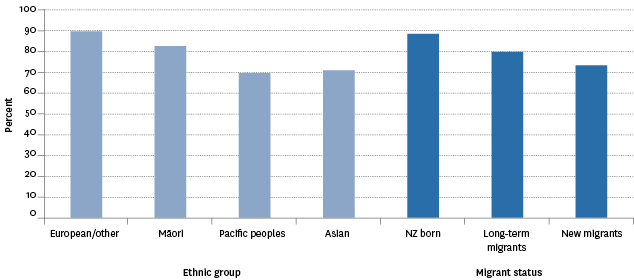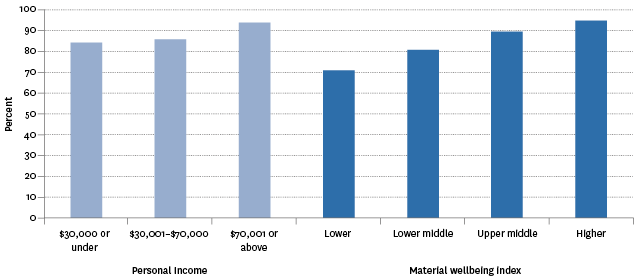Cultural identity
Ability to be yourself in New Zealand
Definition
The proportion of the population aged 15 years and over who felt it was “very easy” or “easy” to be themselves in New Zealand.
RelevanceTop
People have different lifestyles, cultures and ways of expressing their identity. Being able to express who they are is important for people’s sense of self and overall wellbeing. A society which is inclusive of differences is desirable as it enables members to participate fully in life, and gives them a sense of belonging and security.
Current levelTop
A further 11.8 percent said it was sometimes easy and sometimes difficult to be themselves in New Zealand, while 1.9 percent said it was difficult or very difficult to be themselves in New Zealand.
Figure CI4.1 – Proportion of population aged 15 years and over by how easy or difficult
it was to be themselves in New Zealand, 2014

Source: Statistics New Zealand, New Zealand General Social Survey
Age and sex differencesTop
In 2014, older people were more likely than younger people to say they felt it was very easy or easy to be themselves in New Zealand (91.9 percent of 65–74 year olds and 90.0 percent of those aged 75 years and over, compared with 83.8 percent of 25–34 year olds, 84.3 percent of 35–44 year olds and 84.8 percent of 45–54 year olds). The proportions for 15–24 year olds and 55–64 year olds were 86.2 percent and 87.4 percent respectively.
Males and females expressed similar feelings about being themselves in New Zealand (87.4 percent of males felt it was very easy or easy to be themselves, compared with 85.2 percent of females).
Ethnic differencesTop
Those in the European/Other group (90.3 percent) were more likely than Pacific peoples (70.0 percent) and people in the Asian ethnic group (71.3 percent) to say they felt it was very easy or easy to be themselves in New Zealand. The rate for Māori was 83.1 percent.
Migrant status differencesTop
In 2014, New Zealand-born people (89.0 percent) were more likely to say they felt it was very easy or easy to be themselves in New Zealand, compared with longer-term migrants (80.3 percent) and migrants who had arrived in New Zealand within the last five years (73.7 percent).
Figure CI4.2 – Proportion of population aged 15 years and over who felt it was very
easy or easy to be themselves in New Zealand, by ethnic group and
migrant status, 2014

Source: Statistics New Zealand, New Zealand General Social Survey
Socio-economic differencesTop
In 2014, people with higher personal incomes were more likely than people with lower incomes to feel it was very easy or easy to be themselves in New Zealand (93.7 percent of those with incomes over $70,000, compared with 84.3 percent for those with incomes under $30,001). The rate for those with personal incomes between $30,000 and $70,000 was 85.8 percent.
People in the higher (94.6 percent) and upper middle (89.5 percent) material wellbeing index categories were more likely than people in the lower middle (80.6 percent) and lower (70.9 percent) material wellbeing index categories to say that they felt it was very easy or easy to be themselves in New Zealand.
Figure CI4.3 – Proportion of population aged 15 years and over who felt it was very
easy or easy to be themselves in New Zealand, by personal income and
Material Wellbeing Index, 2014

Source: Statistics New Zealand, New Zealand General Social Survey
Labour force status differencesTop
Employed people (87.4 percent) and those not in the labour force (85.1 percent) were more likely than unemployed people (76.2 percent) to feel it was very easy or easy to be themselves in New Zealand.
Family type differencesTop
The proportion of people living in a couple without children who felt it was easy or very easy to be themselves in New Zealand was 89.7 percent. The proportions for people living in a couple with children, those not in a family nucleus and sole-parent families were 85.7 percent, 84.6 percent and 81.6 percent respectively.
Regional differencesTop
People in Taranaki (90.2 percent) and Waikato (89.4 percent) had the highest proportions of people who felt it was very easy or easy to be themselves in New Zealand. People living in Auckland (85.3 percent) and Bay of Plenty (86.6 percent) had the lowest proportions agreeing with this.
Data for this section can be found at: www.socialreport.msd.govt.nz/documents/2016/ci4.xlsx

